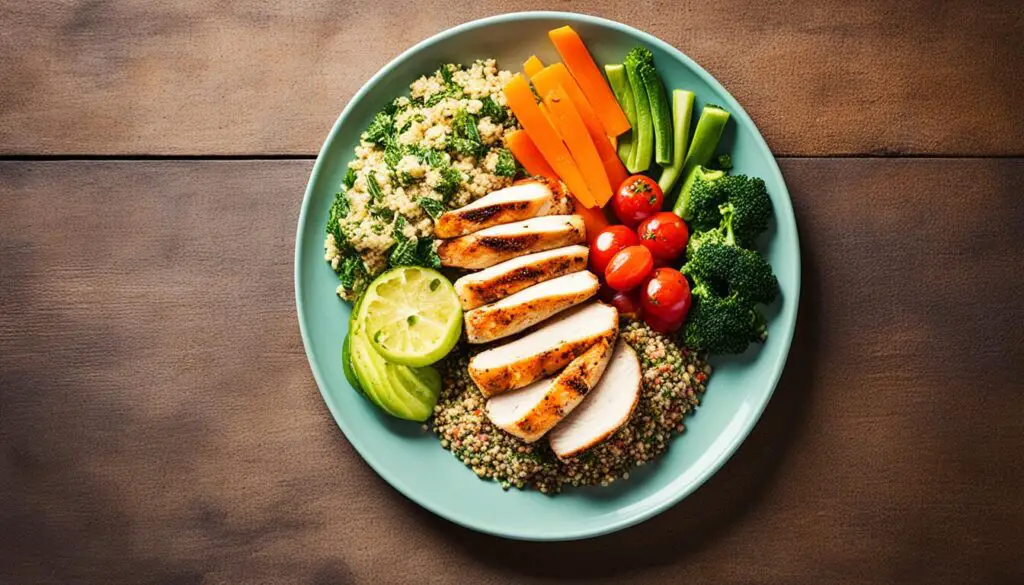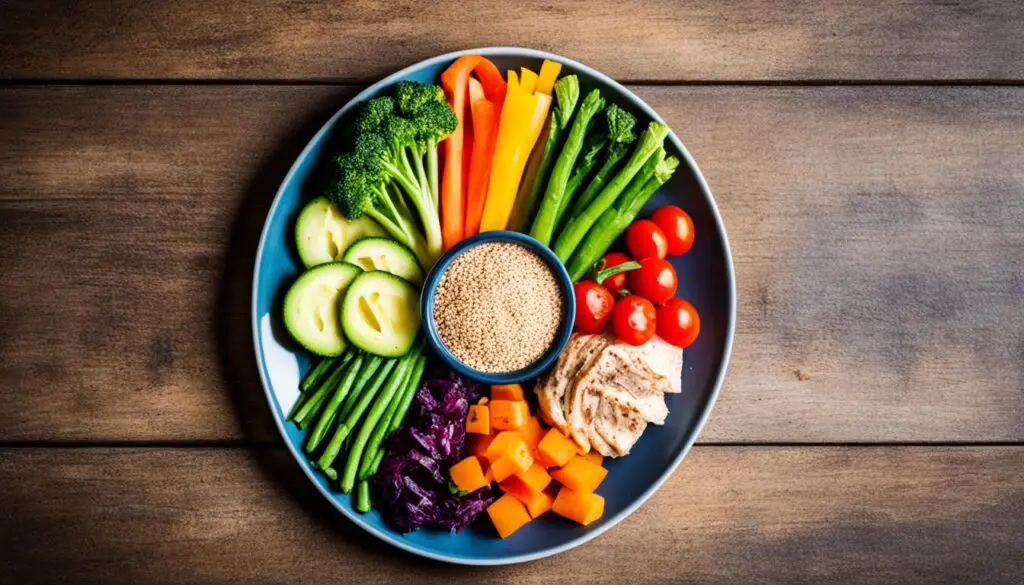Are you considering the HCG diet as a quick fix for weight loss? Before you jump into this controversial plan, it’s important to take a step back and consider the long-term implications. While the HCG diet promises rapid weight loss, there are serious concerns about its safety and effectiveness.
The HCG diet combines the use of HCG supplements or injections with an extremely low-calorie diet. But is it worth the risks? And are there safer alternatives for sustainable weight loss? Let’s take a closer look at the HCG diet and explore a long-term view to help you make an informed decision.
Key Takeaways:
- Before starting the HCG diet, consult with a healthcare provider or registered dietitian
- HCG diet combines HCG supplements or injections with extreme calorie restriction
- The HCG diet meal plan involves strict calorie restriction and limited food choices
- The HCG diet is considered highly unsafe, unhealthy, and illegal by health experts
- Sustainable weight loss through balanced nutrition and regular physical activity offers long-term health benefits
Understanding the HCG Diet
The HCG diet is a weight loss plan that combines HCG supplements or injections of the HCG hormone with a significant reduction in calorie intake. The diet is typically divided into three phases: loading, weight loss, and maintenance.
The Three Phases of the HCG Diet
The first phase, known as the loading phase, involves consuming high-fat, high-calorie foods while starting HCG supplements. This phase typically lasts for two days, allowing the body to store additional calories for the subsequent phases.
The weight loss phase is the most restrictive phase of the HCG diet. During this phase, individuals consume only 500 to 800 calories per day, primarily from lean proteins, approved vegetables and fruits, and limited starches. This extreme calorie restriction is believed to trigger the body to burn fat for energy.
The maintenance phase marks the transition from the weight loss phase to a more sustainable eating plan. Calorie intake gradually increases, and individuals discontinue HCG supplements. This phase is crucial for stabilizing weight loss and establishing long-term habits.
It is important to note that while the HCG hormone is believed to alter the body’s hormones and promote fat burning, there is no substantial evidence to support its effectiveness or safety for weight loss according to the FDA and many health experts. The HCG diet’s extreme calorie restriction may lead to nutrient deficiencies and potential risks.
“The HCG diet combines HCG supplements or injections of the HCG hormone with a drastic reduction in calorie intake.”
While some people may experience quick weight loss on the HCG diet, it is essential to prioritize overall health and consider safer and more sustainable weight loss methods. Consulting with a healthcare provider or registered dietitian is important, especially if you have an underlying health condition.
Sample HCG Diet Meal Plan
| Meal | Food |
|---|---|
| Breakfast | Tea or coffee (without sugar) and a small amount of milk |
| Lunch | 3.5-ounce serving of lean protein (chicken, beef, or fish), two servings of approved vegetables, and one serving of fruit |
| Dinner | 3.5-ounce serving of lean protein, two servings of approved vegetables, and one serving of fruit |
| Optional | Starches like breadsticks or melba toast may be included in some versions of the diet |
| Condiments | Herbs, spices, and certain seasonings are allowed for flavoring, but oils and dressings are prohibited |
This sample HCG diet meal plan outlines the types of foods consumed during the weight loss phase. It is essential to follow the specific guidelines of the HCG diet to achieve the desired weight loss results.
The HCG diet is a highly controversial weight loss plan that requires careful consideration. It is recommended to prioritize long-term health and consult with healthcare professionals or registered dietitians for personalized advice and support in achieving sustainable weight loss goals.
The HCG Diet Meal Plan

The HCG diet meal plan involves strict calorie restriction and limited food choices. Adhering to the plan is crucial to achieve the desired weight loss results.
For breakfast, you can enjoy tea or coffee without sugar, and a small amount of milk is allowed. It is important to note that the HCG diet emphasizes the importance of portion control and calorie restriction.
“Following the HCG diet meal plan is essential for successful weight loss.”
During lunch and dinner, your meals will typically consist of a 3.5-ounce serving of lean protein, such as chicken, beef, or fish. These sources of protein are low in calories and can help keep you feeling satisfied.
Along with the lean protein, you will have two servings of approved vegetables. These vegetables are low in calories and rich in nutrients, providing essential vitamins and minerals.
Additionally, you will have one serving of fruit to add variety and natural sweetness to your meals. The consumption of fruits provides essential fiber and micronutrients.
In some versions of the HCG diet, starches like breadsticks or melba toast may be included. These options are limited to specific quantities and are intended to add variety and satisfaction to the meal plan.
While following the HCG diet meal plan, you are allowed to use herbs, spices, and certain seasonings to add flavor to your meals. However, oils and dressings should be avoided due to their higher calorie content.
It is important to remain committed to the HCG diet meal plan and follow its guidelines meticulously. This will ensure that you achieve optimal results and stay on track with your weight loss goals.
Following the HCG diet meal plan can be challenging, but it provides structure and guidelines for successful weight loss. By focusing on calorie restriction, portion control, and approved foods, you can work towards achieving your desired weight loss goals.
The Safety and Legality of the HCG Diet
When considering any weight loss plan, it is important to prioritize safety and legality. Unfortunately, the HCG diet falls short in these aspects. Health experts widely regard the HCG diet as highly unsafe, unhealthy, and even illegal. It is crucial to be aware of the risks and legality issues associated with this diet before considering it as an option for weight loss.
One key concern is the safety of HCG supplements for weight loss. It is important to note that these supplements are not approved by the FDA for weight loss purposes. In fact, the FDA has issued warnings about the safety and fraudulent claims of HCG supplements. The use of unregulated HCG supplements can pose potential risks to your health.
Only prescription HCG drugs, specifically approved for the treatment of female infertility, are legally sold in the United States.
Moreover, over-the-counter HCG products have been banned by the FDA due to their lack of safety and efficacy. Therefore, it is essential to understand that the HCG diet, which relies heavily on HCG supplements, involves the use of products that have not been approved for weight loss purposes.
It is always advised to prioritize your health and well-being when considering a weight loss plan. There are numerous safer alternatives for achieving sustainable weight loss that are supported by health experts and are legally available. Consulting with a healthcare provider or registered dietitian is crucial to finding a safe and effective weight loss plan tailored to your specific needs and goals.
Remember, your health should always be the top priority.
Potential Risks and Side Effects of the HCG Diet
The HCG diet poses several potential risks and side effects due to its extreme calorie restriction and reliance on HCG supplements. It is crucial to understand these risks and prioritize your health when considering this weight loss plan.
One of the main risks of the HCG diet is the potential for nutrient deficiencies. With the extreme calorie restriction, it is difficult to obtain all the necessary vitamins, minerals, and macronutrients that the body needs to function properly. This can lead to fatigue, weakness, and other health complications.
Another concern is the development of disordered eating patterns. The restrictive nature of the HCG diet may trigger an unhealthy relationship with food, leading to obsessive thoughts about eating, intense hunger, and a cycle of restriction and binging.
The extreme calorie restriction can also cause intense hunger, fatigue, and dizziness. Consuming only 500 to 800 calories per day can leave individuals feeling weak and deprived, which can negatively impact their overall well-being.
Furthermore, severe calorie restriction can have long-term effects on the metabolism. The body adjusts to the low-calorie intake by slowing down the metabolic rate, making it harder to maintain weight loss in the future. This can result in weight regain once normal calorie intake is resumed.
Lastly, the use of unregulated HCG supplements poses unpredictable health risks. Over-the-counter HCG products have been banned by the FDA due to safety concerns. The lack of regulation and quality control makes it difficult to determine the safety and effectiveness of these supplements.
Considering these potential risks and side effects, it is essential to prioritize your health and explore safer alternatives for weight loss. Consulting with a healthcare professional or registered dietitian can provide personalized advice and guidance to achieve your weight loss goals in a safe and sustainable manner.
The Duration and Phases of the HCG Diet

The HCG diet is structured into three distinct phases, each serving a specific purpose in achieving weight loss goals. Understanding the duration and progression of these phases is essential for individuals considering the HCG diet.
The Loading Phase
The first phase of the HCG diet is known as the loading phase. During this phase, individuals consume high-fat, high-calorie foods while starting HCG supplements. The loading phase typically lasts for two days and aims to build up fat reserves in the body in preparation for the subsequent weight loss phase. It is crucial to follow the guidelines provided by a healthcare professional or Registered Dietitian during this phase to ensure proper execution.
The Weight Loss Phase
Following the loading phase, individuals transition into the weight loss phase, which is the most critical component of the HCG diet. During this phase, calorie intake is significantly restricted to 500 to 800 calories per day while continuing with the HCG supplements. The low-calorie diet typically consists of lean proteins, approved vegetables, fruits, and limited starches. It is important to note that the duration of the weight loss phase may vary depending on individual weight loss goals, ranging between 23 to 40 days.
The Maintenance Phase
Upon completion of the weight loss phase, individuals enter the maintenance phase. The purpose of this phase is to stabilize weight loss and transition to a long-term eating plan. Gradually increasing calorie intake, individuals reintroduce a wider variety of foods into their diet, including healthy fats, complex carbohydrates, and a sustainable balance of proteins, fruits, and vegetables. Additionally, HCG supplements are discontinued during the maintenance phase.
The duration of the maintenance phase typically lasts for three weeks. This phase acts as a crucial period for individuals to establish healthy eating habits and lifestyle changes required to sustain their weight loss progress. During this phase, it is essential to monitor caloric intake, engage in regular physical activity, and consult with healthcare professionals or Registered Dietitians to ensure a smooth transition.
Following the completion of the maintenance phase, individuals are encouraged to continue making healthy choices, adopting a balanced diet, and engaging in regular exercise to maintain their weight loss in the long term.
Success Strategies for the HCG Diet
While the HCG diet is not recommended or supported by health experts, individuals who still choose to follow the diet may benefit from certain success strategies. It is important to approach the HCG diet cautiously and prioritize overall health and well-being. Here are some strategies that can potentially contribute to a successful HCG diet journey:
- Closely follow the meal plan: Adhering to the prescribed HCG diet meal plan is crucial for achieving the desired results. This includes consuming the recommended portion sizes of lean protein, approved vegetables, and fruits while strictly limiting starches and avoiding oils and dressings.
- Stay hydrated: Drinking an adequate amount of water throughout the day is important for overall health and helps with digestion, detoxification, and weight loss. Aim to drink at least eight cups (64 ounces) of water daily during the HCG diet.
- Seek support from healthcare professionals or registered dietitians: Consulting with professionals who specialize in nutrition and weight management can provide valuable guidance and support throughout your HCG diet journey. They can help monitor your progress, make necessary adjustments to the meal plan, and address any concerns or challenges that may arise.
- Monitor progress: Keeping track of your weight loss progress is essential for staying motivated and making informed decisions. Regularly weigh yourself at the same time each day and record the results. This will help you assess your progress and make any necessary adjustments to your diet and exercise routine.
- Incorporate regular physical activity within safe limits: Engaging in moderate physical activity can complement your HCG diet and contribute to overall health. However, it is important to consult with your healthcare provider or registered dietitian to determine safe exercise options during the low-calorie phase of the diet. They will provide guidance on exercises that are appropriate for your individual situation.
By following these success strategies, individuals may enhance their experience with the HCG diet. However, it is crucial to note that the HCG diet is not widely recognized as a safe or effective weight loss method by health experts.
Testimonial:
“I found that closely following the meal plan and staying in touch with my healthcare provider was key to my success on the HCG diet. The regular monitoring of my progress and the support I received made a significant difference in my overall journey. It is important to prioritize your health and well-being and seek professional guidance throughout the process.”
– Sarah, HCG diet participant
| Success Strategies | Benefits |
|---|---|
| Closely follow the meal plan | Optimizes weight loss and adherence to the diet |
| Stay hydrated | Aids digestion, detoxification, and overall well-being |
| Seek support from healthcare professionals or registered dietitians | Obtain expert guidance and personalized advice |
| Monitor progress | Track weight loss and make informed decisions |
| Incorporate regular physical activity within safe limits | Complements the diet and improves overall health |
Long-Term Health Benefits of Sustainable Weight Loss

While the HCG diet may result in quick weight loss, it is essential to prioritize sustainable and healthy weight loss methods for long-term health benefits. Sustainable weight loss not only helps individuals achieve their desired weight but also offers a range of positive impacts on overall well-being and reduces the risk of chronic diseases.
One of the significant long-term health benefits of sustainable weight loss is improved cardiovascular health. Excess weight and obesity can strain the heart and increase the risk of heart disease, high blood pressure, and other cardiovascular issues. By adopting sustainable weight loss strategies, individuals can lower their cardiovascular risk, improve heart function, and enhance overall cardiovascular well-being.
Another crucial aspect of sustainable weight loss is the reduced risk of chronic diseases. Obesity is associated with a higher risk of conditions such as type 2 diabetes, certain cancers, and metabolic syndrome. By achieving and maintaining a healthy weight through sustainable methods, individuals can mitigate these risks and improve their overall health profile.
Maintaining a sustainable weight loss also has a positive impact on mental health. Weight loss can boost self-esteem, confidence, and body image, leading to improved mental well-being. Additionally, adopting a balanced and nutritious eating plan that supports weight loss can enhance brain health and cognitive function.
Increased energy levels are another benefit of sustainable weight loss. By shedding excess pounds, individuals reduce the strain on their bodies and experience more vitality and stamina throughout the day. This increase in energy further enhances overall productivity, engagement in physical activities, and the individual’s quality of life.
It is crucial to highlight that sustainable weight loss requires a comprehensive approach beyond just dietary changes. Regular physical activity is a vital component of any weight loss journey, as it not only aids in burning calories but also improves cardiovascular fitness, muscle strength, and overall body composition.
By adopting an active lifestyle and making smart food choices, individuals can achieve sustainable weight loss and reap the long-term health benefits it offers. It is important to remember that the HCG diet, with its extreme calorie restriction and reliance on supplements, is not a sustainable or safe option for weight loss. Prioritizing sustainable and evidence-backed methods is key to achieving lasting results.
Remember, this is your health journey. Focus on making sustainable changes that support your overall well-being and consult with healthcare professionals or registered dietitians for personalized guidance.
Maintaining Weight Loss After the HCG Diet

Maintaining weight loss after the HCG diet requires making sustainable lifestyle changes. It is important to transition from the HCG diet to a balanced and nutritious eating plan that focuses on long-term health rather than short-term weight loss goals.
Adopting a Balanced and Nutritious Diet
One of the key factors in maintaining weight loss is adopting a balanced and nutritious diet. This involves incorporating a variety of nutrient-dense foods, such as fruits, vegetables, whole grains, lean proteins, and healthy fats, into your daily meals. Avoid restrictive diets and instead focus on creating a healthy eating plan that you can maintain in the long run.
Engaging in Regular Physical Activity
Regular physical activity is essential for maintaining weight loss and overall health. Find activities that you enjoy and make them a part of your daily routine. This could include activities like walking, jogging, cycling, swimming, or participating in fitness classes. Aim for at least 150 minutes of moderate-intensity exercise or 75 minutes of vigorous-intensity exercise per week.
Managing Stress Levels
Stress can impact weight management efforts, so it’s important to find healthy ways to manage stress. Engage in stress-reducing activities that you enjoy, such as practicing mindfulness, yoga, meditation, or spending time with loved ones. Prioritizing self-care and relaxation can help prevent emotional eating and promote weight maintenance.
Getting Enough Sleep
Adequate sleep plays a crucial role in weight management. Lack of sleep can disrupt hunger hormones and increase cravings for unhealthy foods. Aim for 7-9 hours of quality sleep each night to support your weight maintenance efforts.
Staying Hydrated
Drinking enough water throughout the day is important for overall health and can also support weight management. Staying hydrated helps you feel fuller, aids in digestion, and can prevent unnecessary snacking. Aim to drink at least 8 cups (64 ounces) of water daily.
Monitoring Progress
Regularly monitoring your progress can help you stay accountable and make adjustments as needed. Keep track of your weight, measurements, and how you feel both physically and mentally. Celebrate your successes and make any necessary changes to maintain your weight loss journey.
| Maintaining Weight Loss Tips |
|---|
| Adopt a balanced and nutritious diet |
| Engage in regular physical activity |
| Find healthy ways to manage stress |
| Prioritize getting enough sleep |
| Stay hydrated by drinking enough water |
| Monitor progress and make adjustments as needed |
By implementing these lifestyle changes, you can increase your chances of maintaining weight loss after the HCG diet. Remember to focus on long-term health and well-being rather than short-term weight fluctuations.
Conclusion
The HCG diet, while popular, is a weight loss plan that comes with potential risks and limited evidence of effectiveness. It is crucial to prioritize long-term health and explore safer and more sustainable weight loss methods. Sustainable weight loss not only helps in achieving desired weight goals but also leads to long-term health benefits and improved overall well-being.
To ensure safe weight loss, seek guidance from healthcare professionals or registered dietitians who can provide personalized advice and support. They can help you develop a balanced and nutritious eating plan, create a suitable exercise routine, and make lifestyle changes that promote sustainable weight loss.
Remember, the key to successful weight management is adopting a holistic approach, focusing not just on short-term weight loss but on long-term health and well-being. Embracing sustainable habits, such as nourishing your body with a balanced diet, engaging in regular physical activity, managing stress levels, and getting adequate sleep, will help you maintain your weight loss and enjoy a healthier lifestyle.
FAQ
How should I prepare for the HCG diet with a long-term view?
Before starting the HCG diet, it is important to consult with a healthcare provider or registered dietitian, especially if you have an underlying health condition. It is also essential to have a clear understanding of the potential risks and limited evidence of effectiveness associated with the HCG diet. Considering safer alternatives for weight loss is recommended.
What is the HCG diet and how does it work?
The HCG diet combines HCG supplements or injections of the HCG hormone with an extreme calorie restriction. It typically consists of three phases: the loading phase, the weight loss phase with limited calorie intake, and the maintenance phase. The HCG hormone is believed to promote fat burning. However, the effectiveness and safety of the HCG hormone for weight loss have not been supported by substantial evidence according to the FDA and many health experts.
What does the HCG diet meal plan involve?
The HCG diet meal plan involves strict calorie restriction and limited food choices. It includes a 500 to 800 calorie intake per day, primarily through lean proteins, approved vegetables, and fruits. Some versions of the diet also allow small amounts of starches. Oils and dressings are prohibited, but herbs, spices, and certain seasonings are allowed for flavoring.
Is the HCG diet safe and legal?
The HCG diet is considered highly unsafe, unhealthy, and illegal by health experts. HCG supplements for weight loss are not approved by the FDA, and over-the-counter HCG products have been banned. Only prescription HCG drugs for the treatment of female infertility are legally sold in the United States.
What are the potential risks and side effects of the HCG diet?
The HCG diet can lead to several risks and side effects, including nutrient deficiencies, disordered eating patterns, intense hunger, fatigue, dizziness, and a slowed-down metabolism. The use of unregulated HCG supplements may also pose unpredictable health risks. It is important to prioritize overall health and consider safer alternatives for weight loss.
How long does the HCG diet last, and what are its phases?
The duration of the HCG diet typically ranges from 26 to 43 days, depending on weight loss goals. It consists of three phases: the loading phase, where high-fat, high-calorie foods are consumed while starting HCG supplements; the weight loss phase with restricted calorie intake; and the maintenance phase, where calorie intake is gradually increased, and HCG supplements are discontinued.
What are some success strategies for the HCG diet?
To increase the chances of success with the HCG diet, it is important to closely follow the meal plan, stay hydrated, seek support from healthcare professionals or registered dietitians, monitor progress, and incorporate regular physical activity within safe limits. However, it is crucial to approach the HCG diet cautiously and prioritize overall health and well-being.
What are the long-term health benefits of sustainable weight loss?
Sustainable weight loss can lead to various long-term health benefits, including improved cardiovascular health, reduced risk of chronic diseases, better mental health, increased energy levels, and improved overall well-being. It is recommended to focus on balanced and nutritious eating plans, regular physical activity, and overall lifestyle changes for long-term health benefits.
How can I maintain weight loss after the HCG diet?
Maintaining weight loss after the HCG diet requires adopting sustainable lifestyle changes. This includes following a balanced and nutritious diet, engaging in regular physical activity, managing stress levels, getting enough sleep, staying hydrated, and monitoring progress. It is important to avoid falling back into old habits and prioritize long-term health rather than solely focusing on short-term weight loss goals.
What is the conclusion regarding the HCG diet and sustainable weight loss?
The HCG diet is a controversial weight loss plan that has potential risks, limited evidence of effectiveness, and is considered unsafe and illegal by health experts. Prioritizing long-term health and considering safer and sustainable weight loss methods is essential. Sustainable weight loss can lead to long-term health benefits and improved overall well-being. It is recommended to seek guidance from healthcare professionals or registered dietitians for personalized advice and support in achieving sustainable weight loss goals.




